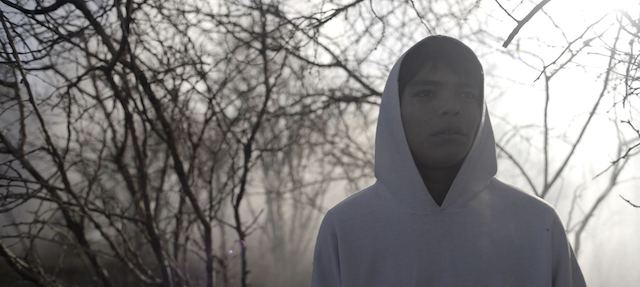
@Courtesy of Sundance Institute
Is it possible for young people to break cycles of violence? And what would it take for that to happen? These are the questions the Sundance winner of best international feature “Sujo” poses when portraying a boy who grows up under lurking cartel violence in the Mexican countryside. But instead of exploring the often-seen ravages of Mexican drug violence, new angles shine through. In their follow up to the equally excellent “Identifying Features” (2020), Mexican director’s and screenwriter’s Fernanda Valadez and Astrid Rondero establish themselves as masters of mood-piece cinema, once again mixing the gritty with hypnotic lyricism.
At the age of 4, Sujo (Kevin Aguilar) becomes an orphan when his father, a sicario for the local cartel known as “The Eight”, is murdered as a traitor – his mother had died while giving birth. Left in the care of his aunt Nemesia (Yadira Pérez), a single mother living in a secluded house, the boy must be hidden – as part of long standing traditions male descendants of assassinated cartel members must also be killed. They would otherwise seek revenge when growing up. Nemesia pleads for Sujo’s life to be spared which is granted as long as he never visits the town or goes to school there. He is provided shelter and safety and grows up isolated from the world.
It seems unavoidable to not be rebellious for someone who cannot be seen or heard. As he enters his teenage years, mild mannered Sujo (an exceptional Juan Jesús Varela who also played the lost son in ‘Identifying Features”) ignores all the warnings and soon drifts into crime as low-ranking drug mule fueled by his cousins Jai (Alexis Varela) and Jeremy (Jairo Hernández). The three are like brothers. Nemesia, who has a sixth sense, and is visited by ghosts, puts Sujo on a bus to Mexico City with the words “don’t ever come back”. And off he goes.
Rondero and Valadez divide their screenplay into four parts, each named for a different character. It’s perfectly written and sensitive. Sujo seems doomed to follow in the footsteps of his father, but the directors choose to give him another, more optimistic road to walk on. “I am not my father”, he says, seemingly determined to reinvent himself. After arriving in Mexico City, he finds a job at a warehouse and a place to live. A new, less fearful, chapter begins. The film wants to explore the possibilities of changing life and direction, yet is never naive about it.
Sujo finds a mentor, the straightforward Argentinian teacher Susan (Sandra Lorenzano), who immigrated from Argentina to escape the dictatorship. She takes him under her wings and recognizes his potential, helping him to make up for his lack of a basic education – Sujo wants to study literature. As everyone knows, education is the device in which many youngsters may escape the violence. But most won’t ever see that day, the opportunities are spare.
While most films in this traditionally brutal genre, about drug wars in Mexico, about sons to criminal macho dads and the mechanism of generation trauma, tend to focus on the unavoidable, the impossible, victims and perpetrators, “Sujo” suggests that cycles can be broken. The film also refuses to explicitly show the monstrous violence that takes place off camera and outside the storyline. Instead, the audience fills in the blanks. It is effective. But nevertheless, the tension and danger hangover Sujo’s world like a wet towel, although less present in the city.
When cousin Jai pays a visit (he needs money) Sujo makes bad choices and seems doomed again – he is the loyal kind and sees his cousin as a real brother. Fortunately, there are women in this world. Women who care, struggle, save, and carry boys on their peaceful shoulders. The ones who must bear the consequences of the violent culture. Women represent another way from it. This is also what the film’s main theme explores – women are the pillars of the society and keep things together by helping avoid a descent into chaos.
One of the most striking aspects about “Sujo” is the mixture of the coming-of-age story in a grim reality and the otherworldly lyrical tone, together with the beauty of nature, shot by cinematographer Ximena Amann. There are magical realism and supernatural elements, in the form of ghosts passing on messages, that fits organically into the story. The atmosphere gives the film a layered soul and creates a strong sense of place. In the Mexican countryside, fire, water, animals, and the night sky with a very present moon, make the eyes wet with admiration. Nature is energy. It is a reminder of the potential of what could be, what has been, and freedom. Even if it changes to the soiled urban landscape, this remains in your mind. What also remains is Sujo’s smile when the teacher gives him books to read. Humanity rules, after all.
Grade: A
Check out more of Niclas’ articles.
Meet the Artist 2024 : Astrid Rondero and Fernanda Valadez on “Sujo”

